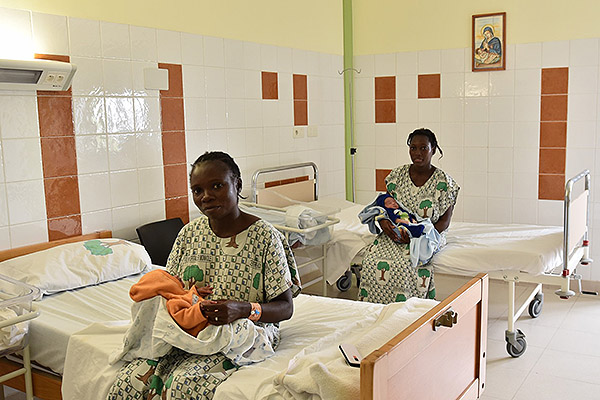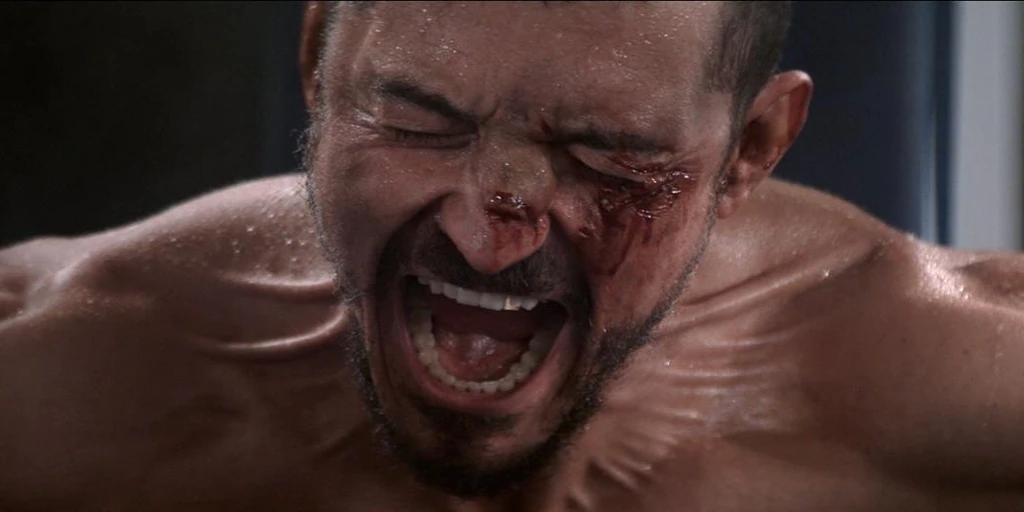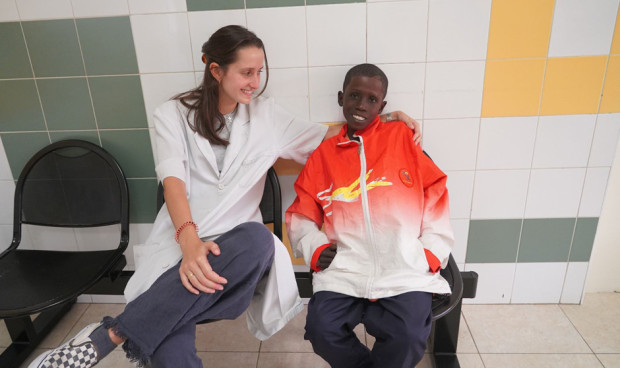Clara Serrano with a patient at Monkole Hospital in Kinshasa (Democratic Republic of the Congo).
Clara Serrano is one cycle away from obtaining her medical degree. The young woman has already begun what will be the last year of rotation before sitting for the MIR exam. In her mind, future study hours begin to fly, as well as a long-awaited place in cardiology, gynecology or internal medicine. The idea of a summer of strict calendar, observations and internships is also taking shape. A very different summer To those who have lived this year. Just three weeks before returning to the routine set by the hospital and the CEU San Pablo University in Madrid, The student walked through the sandy streets of Kinshasa.the capital of the Democratic Republic of the Congo. He was there to heal, to understand and to learn. An experience he considers essential to any physician’s ability to understand. “It was my last chance to do this and I don’t regret it,” he said. Medical Writing.
Without hesitation, he packed his bags and entered Congo. All it took was an offer from a college friend to convince her that she would spend three weeks in August in Africa’s fourth most populous city. And that’s how he landed at Kinshasa airport on August 2. His goal was to be part of a team of volunteers. Friends of Moncol FoundationWho works at the hospital of the same name. A modern center – with 120 beds and all specialties – that appears among the modest houses that make up the western part of the country’s capital. There, the NGO serves those who cannot afford the national health system.
Under the organization’s protection, Serrano focused his work on gynecology and pediatrics. The young woman participated in cervical cancer screenings for women.to prevent the development of this disease in the cervix. At the same time, she took care of boys and girls, but also mothers during childbirth and caesarean sections. In better and worse conditions. From the technology of the Moncol hospital to the lack of resources in rural areas. “We were in a town where we worked in the delivery room of the health center. There was no electricity or water. The medicines were very old and the operating table was scary,” Serrano commented.
|
Serrano with a patient in the maternity unit at Monkole Hospital (Kinshasa, Democratic Republic of the Congo). |
Firm despite lack of resources
The Ministry of Foreign Affairs recommends avoiding hospital facilities in the Democratic Republic of the Congo except in urgent cases. After this statement there is A private health system weakened by the impact of various epidemicsFrom Covid to MPOX, malaria persists. The country has dozens of referral hospitals – all in Kinshasa – while private consultations are rife around them where minimum sanitary conditions are not respected. “Sometimes these places are the only solution for the population, but they risk their lives. Once a woman came to us bleeding in a taxi after having been treated in one of these centers,” said the president and founder of the Association of Friends of the Foundation, Enrique Barrios.
On the other hand, Doctors are rare – For example, there are 10 anesthesiologists in the country, Barrios said – and they are not well paid. Most of them earn no more than US$100 a month. Moreover, many of them are not adequately trained. “The medical schools in Kinshasa are not very prestigious. There are cases where students pay for the certification,” the aid worker lamented. Serrano added that he was surprised by the calmness with which they deal with the patient. “They are very calm,” he said. “While you run around all day in Spain, a consultation there can take a long time. Even in an emergency, they take it little by little.”
But despite the difficulties and lack of resources, the medical student admitted Ability to solve Congolese doctors“They have poor infrastructure and few devices, but they are skilled enough to respond to the major health problems they face. For example, they can diagnose and treat a case of malaria in three hours. They also have rapid tests that they can even do in places where a doctor from another place would not dare and succeed. It is true that they do not know more modern treatments, but that is enough for them,” said the medical student, who stressed that they are gradually incorporating new methods for chronic diseases such as diabetes or hypertension.

Maternity unit at Monkole Hospital (Kinshasa, Democratic Republic of the Congo). |
The need to enhance the training of local doctors
The Friends of Monkole Foundation has been operating in Kinshasa for 15 years. The organization covers different areas.such as maternity care, through accompaniment or the provision of medicines. They also solve cases of rickets and clubfoot in minors, through operations run by European doctors. They organize cervical cancer screening for more than 1,500 women per year, their subsequent check-ups and their thermal ablation treatment. Not counting the full assistance for people who cannot afford a hospital bed. A job that combines managing the arrival of doctors, nurses and dentists from Spain to care for patients. This year alone, 15 people have already traveled.
However, one of its main goals is to Enhance training“The idea is for Congolese doctors to learn how to treat the most difficult cases. So doctors come from Spain to supervise certain operations so that local people can learn,” said Barrios, who wants the Monkole hospital to have a medical school. “We want to contribute to the next wave of doctors in the country.”
Serrano agrees with the founder of the Health Collaboration and goes further: Education should also fall on the shoulders of citizens.“Patients do not have information about many chronic diseases, so it is difficult for them to distinguish between symptoms. Moreover, if you explain to them how some treatments work, they do not want to apply them because they think they are magic,” the student stated. This last belief mainly affects vaccination. The vaccination dose is practically zero in the country.with a calendar that eludes measles, rotavirus, cervical cancer or meningitis. A problem exacerbated by the lack of vaccines themselves. “The medicine for HPV hasn’t arrived yet. It’s very expensive,” Barrios sighs.
On August 24, Serrano took off for Madrid. In his retina, a different reality. “You learn to see the differences between countries and you have to apply treatments that have been studied in a context opposite to the Spanish one,” he said. Once you become a specialist, His intention is to return. It is part of the training missions of Congolese doctors. MIR’s notebooks will be closed, but its link to sub-Saharan Africa still has blank pages.
The information published in Medical Writing contains statements, information and advertisements from official institutions and health professionals. However, if you have any questions regarding your health, consult your appropriate health professional.

“Social media evangelist. Student. Reader. Troublemaker. Typical introvert.”



:quality(85)/cloudfront-us-east-1.images.arcpublishing.com/infobae/ZS6O75ELJFCLPIB6M25CZ7W43Q.com)



More Stories
UASD Educational Sciences organizes a conference on climate change in living organisms – El Nuevo Diario (Dominican Republic)
The Science Park will renovate its planetarium display system.
UdeG scientists win State Prize for Innovation, Science and Technology 2024